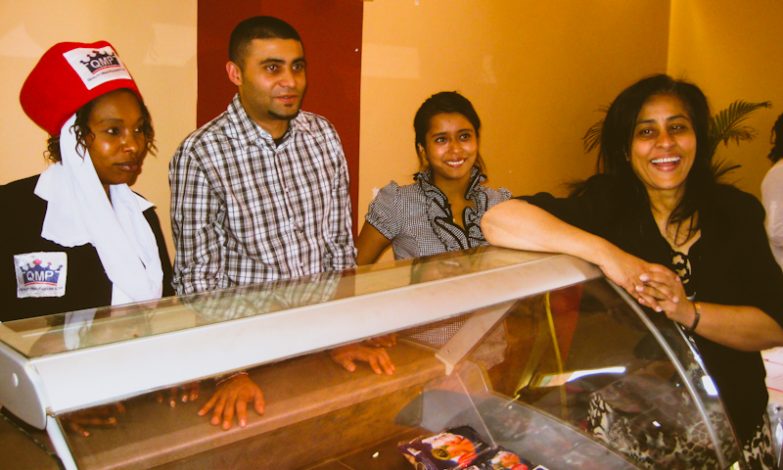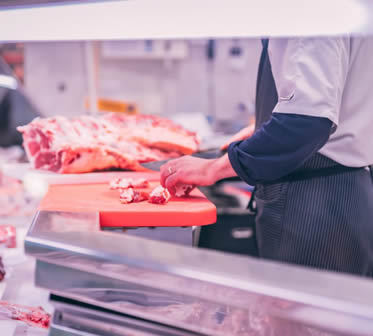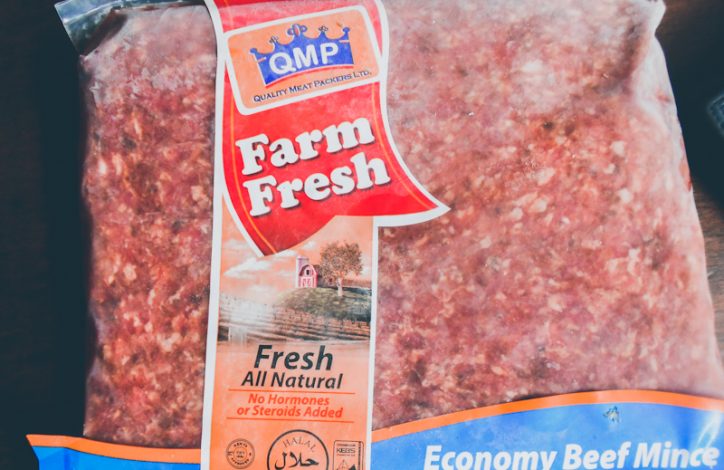
Mrs Rita Diamond Velj together Quality Meat Packers Staff at a past event.
A lot of people would love to venture into agriculture profitably but do not know-how. Many shy away from the idea of giving excuses that range from lack of enough farming land to having inadequate knowledge of pursuing the lucrative venture.
“Agri-business is the future of this country’s economy,” …This is a belief held by Diamond Velji and Rita Velji, the Quality Meat Packers, a Kenyan firm, The couple is on a mission to pass on the knowledge that they have acquired over the years to any Kenyan who share the same ideals about Agri-business. Quality Meat Packers has grown over the years as the only Kenyan Meat company that represents the country at the annual Gulf Food Exhibition. The event gives focus on modern agricultural technologies and utilizing renewable resources to enhance food production.

To them, there is no limit “for those who do not limit themselves.” They believe that whether you are in an urban centre or not, all you need to do is, believe, focus, have a clear plan, and follow your dream.
“It is possible provided you have the will and the knowledge on how you should do it,” Rita said during this interview. “Agribusinesses are being challenged to meet the globally increasing demand for food, fuel, and fiber, while balancing economic and environmental realities.”
Her sentiments are echoed by Diamond, who says the sector is evolving from a local and regional model to a global structure, “making this a sector of increasing interest to corporations, public agencies, and society at large. New technology is helping agribusiness increase efficiency and cut costs while avoiding wastage.”
I am sure many of you would like to know how Diamond and Rita has survived in this cut-throat industry to build one of East Africa’s biggest privately-owned slaughterhouse and meat processing plants. Here is their secret.
They started as a simple meat retailer to a vertically integrated agribusiness with interests in the production and rearing of fresh beef, lamb and chicken. Now, they have built an enterprise that has now embarked on a “fulfilling” journey of giving back to society. In their targeted list of people are 250 farmers- spread across the country- all benefiting from their wealth of knowledge, gained over the years. “We have walked with the different farmers … enlightening them, applying new strategies, ensuring we move at their pace.” Rita was proud to reveal that majority of the farmers that they are engaging are women.
“I believe in women empowerment because they control the basic unit of society- which is the family.”
The farmers have undergone intensive training on how to rear a wide range of livestock. Rita added, “Bottom line, they need to be able to profit from their farms and agribusiness.” Every farmer that they have engaged has been making a minimum gross profit of KSh90,000 per month. Over the last 5 years, Rita said she has seen transformation where many of those who started off as small-scale farmers have grown and can now play in the big league. Most of these farmers have been individually contracted by Quality MeatPackers Limited- to supply the expansive plant with meat. In turn, the company is able to place Kenyan meat and meat products on tables and plates within Kenya and internationally, including in the Gulf Cooperative Countries and Africa.
“We get our products from the lowest level at the farm. This is one of the biggest advantages of being one of our contracted farmers,” Diamond said. “You benefit directly from working with us.”
Their success, Diamond said is anchored on the people. “If the people are happy, so are we,” the 71-year-old said. Quoting the words of Africa Development Bank President Dr Akinwumi Adesina, he said, “Agriculture was Africa’s past, but agriculture as a business is Africa’s future.”
Tasty meat; Understanding the Process of marinating- But how did what was once a simple meat retailer in Nairobi grow to this level?
Beyond the Kenyan market, Quality Meat Packers Limited wings have expanded overseas, with an eye on penetrating the bigger global market. The big question is, what is so unique about the firm’s products? It is until you visit the processing plant in Ruai, that you begin to fathom the level of class and professionalism that they have invested in the business to ensure that the end product, is nothing short of a delicacy. They have a team of dedicated and well-seasoned researchers who continue to look into the latest technology being used across the world to help them keep up with international standards. The firm has employed 400 people and thousands of others depend on it indirectly. “All we do is about the people, enhancing the quality and flavor of our products,” Diamond said.
Taste, Diamond said, is everything, as he took this reporter through the process of getting the best flavor and quality from the animals they receive. But all this, he explained is within the international quality operating procedures, all approved by relevant government bodies like the Kenya Bureau of Statistics (KEBs). Quality Meat Packers is amongst the few ISO and Halal certified meat processors in Kenya. To ensure quality is maintained, the firm has a government veterinary officer and 5 meat inspectors permanently stationed at the plant. The company produces a wide assortment of HALAL proteins including beef, lamb, goat, chicken, and fish products.
In order to differentiate their offering, QMP not only selling whole meat protein products but also provides clients with customized solutions to make their lives easier. One example of this is one process is that they engage in is marination, which is done exactly as specified by their clients. This, Diamond explained, is meant to “ensure that the product is of the correct weight and of the highest quality standard with a consistent taste.”
How does the firm marinate their meat?
Well, from the onset, Diamond and Rita explained it is not a uniform procedure, but it is based on the needs and requirements stipulated by the client, the market, and the use of the product. “No one wants their meat to taste the same as that of their competitor,” Rita pointed out. Rita went on to take the reporter through their various procedures: QMP offers different ranges of products to their various customers, these include dry aging, wet aging, and various forms of marination based on customer taste and profile.
Dry-aging process
The dry-aging process involves the selection of suitable cuts of meat which are selected from high-grade beef and lamb carcasses. These are hung in an aging chamber where they are hung for a period 7 to 21 days, based on customer requests. During this process temperature and humidity are controlled to ensure the breakdown of enzymes in muscle fibers to tenderize the meat and make it more succulent.
Wet aging process
The wet aging process involves the creation of a brine solution (cold water and proteinases). Proteinases comes from plants such as papain (papaya) and bromelain (pineapple). These are widely known and used natural tenderizers which help breakdown the fibers in meat, thus tenderizing the meat and making it more succulent. This process is done using specialized machinery, brine mixer, brine injector, and tumbler. In the past, this process would be done by Chefs and users in the kitchen, but now there is an increased demand for it to be done at the factory floor in line with recently released KEBS standards for marinated meat and poultry products.
This wet aging process starts with selecting the tender cuts of meat and passing it through a brine injector where the brine enters the meat, thus breaking the tough fibers in the meat. After this, the meat will be put into a temperature-controlled tumbler, as it rotates and massages the meat under cool temperatures, it will retain the brine allowing for the start of tenderization to take place. After this product will be packed in specialized vacuum bags and sealed on a highly automated packing line. These products will then be placed into the “wet aging chamber” and stored for a period of 1 to 21 days again based on customer requirements. One element noted by this writer during the walk-around of QMP was the extensive use of machinery and technology that makes QMP a world-class facility.
These machinery are mostly imported from Germany and Europe and represent a major capital investment for the company. The use of machinery and technology allows us to control the consistency of all finished products, as well as ensuring that the product is produced in a safe environment. Records are maintained as a control measure for consistency. All machine operators are trained to take responsibility of their respective departments and ensure that all equipment, mixing bins, and related components are properly cleaned and stored. Daily lab analysis is done on products, machinery, surfaces, and personnel to ensure that the products are being produced in the safest and most hygienic manner as per relevant regulation and standardization.
As stipulated by KEBS standardization, products are also sampled and analyzed by them on an annual basis, and furthermore on a quarterly basis as per FSSC standardization. QMP also offers the use of this machinery for customers to create their own brine solutions composed of various spices, to be injected into their meat, whether white or red meat. This allows various customers the use of our facilities to impart their specific flavors onto their meat. “The key to everything we do is to offer a one-stop shop solution and to provide customization for client specifications while maintaining the highest possible quality standards.”



Leave a Comment